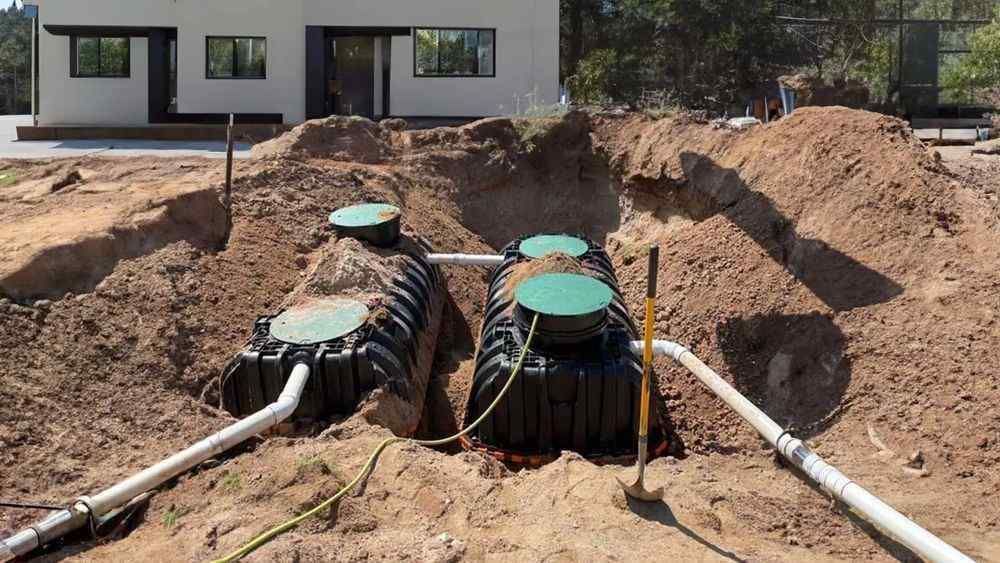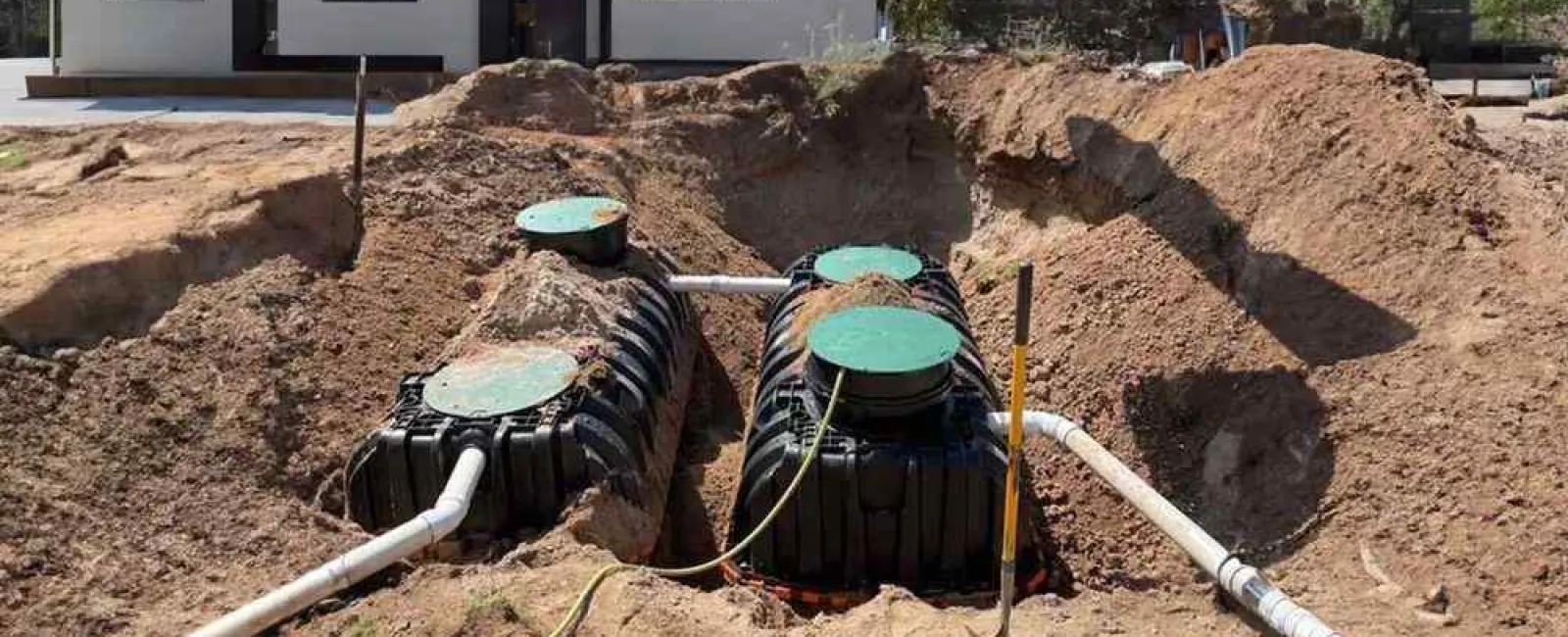Maintaining your septic system properly is crucial for the health of your home, your family, and the environment. It ensures effective wastewater management and extends the longevity of this vital home system. Like any other system, your septic tank requires regular attention to prevent unpleasant emergencies, protect your property, and avoid costly repairs. Here's what you need to look out for to determine if your septic system needs professional attention.

Briefly, How Your Septic System Works
Understanding the basics can help you recognize problems. Your septic system typically has two main parts:
- The Septic Tank: Wastewater from your home flows into this buried, watertight container. Inside, solids settle to the bottom forming sludge, while lighter materials like grease and oils float to the top forming scum. Bacteria in the tank break down some of the organic solids.
- The Drainfield (or Leach Field): The partially treated liquid wastewater (effluent) flows from the tank into the drainfield - a series of underground trenches containing porous materials. Here, the effluent slowly percolates into the soil, where natural processes further treat it before it re-enters the groundwater.
How Often To Pump Your Septic Tank
The recommended frequency for pumping your septic tank depends on several factors:
- Tank Size: Larger tanks can hold more solids.
- Household Size: More occupants mean more wastewater and solids.
- Water Usage Habits: High water usage can push solids into the drainfield prematurely.
- Garbage Disposal Use: Using a garbage disposal significantly increases the solid load in your tank.
- Age of the System: Older systems may require more frequent attention.
Typically, it's advisable to have your septic tank pumped every three to five years. However, if you notice signs of problems, if your household size has increased, or if you frequently use a garbage disposal, you might need to do it more frequently. Regular pumping is essential to remove the build-up of sludge and scum, ensuring the system operates efficiently and preventing solids from entering and clogging the drainfield, which is very expensive to repair or replace. For details on recommended schedules tailored to your situation, visit our septic tank maintenance services.
Warning Signs of Septic System Malfunction
Beyond routine pumping, certain red flags indicate your system needs immediate professional assessment:
- Slow Drains & Gurgling Sounds: If sinks, showers, and toilets drain slower than usual, or if you hear gurgling noises from your plumbing, it could be an early sign of a developing septic problem, like a full tank or a clog.
- Wastewater Backups: This is one of the most obvious and unpleasant indicators. Sewage backing up into household drains (toilets, showers, sinks) is a clear sign your system is failing to manage wastewater effectively. This poses serious health risks and signifies a major issue needing quick resolution.
- Persistent Odors: A recurring "rotten egg" or sulfur smell, either indoors (near drains) or outdoors (especially around the septic tank or drainfield area), indicates that wastewater gases are not being properly contained or treated.
- Soggy Spots or Standing Water: Noticeable dampness, pooling water, or muddy soil around your septic tank or, more critically, over the drainfield area (especially if it hasn't rained heavily) suggests the system is overloaded or the drainfield isn't absorbing effluent properly.
- Unusually Lush or Spongy Grass: While a green lawn is nice, exceptionally lush, vibrant green patches of grass, particularly directly over the drainfield area even during dry weather, can mean untreated effluent is surfacing and acting as fertilizer. This is a sign of drainfield failure.
- Unusually Frequent Pumping Needs: If you find your septic system requires pumping much more frequently than the standard three-to-five-year recommendation (e.g., annually), it's a strong indicator of an underlying problem. This could be due to hydraulic overload, a failing drainfield, or improper usage.
- Septic Alarm Activation (If Applicable): Many modern or specialized septic systems (e.g., those with effluent pumps) have an alarm that will sound if there's a high water level or pump malfunction. Never ignore a septic alarm.
- Well Water Contamination (If You Have a Well): If routine water tests for your private well show an increase in nitrates or bacteria (like E. coli), a failing septic system could be contaminating your drinking water. This is a critical health emergency.
Preventative Measures: Keeping Your Septic System Healthy
To avoid these issues and prolong the life of your septic system, consider the following:
- Conserve Water: The less water you use, the less strain on your system.
- Fix leaks promptly.
- Install water-efficient fixtures (toilets, showerheads).
- Run dishwashers and washing machines only with full loads.
- Spread out water-intensive tasks (like laundry) over the week.
- Proper Waste Disposal: What Goes Down, Matters!
- Do NOT Flush or Pour These Down Drains:
- Non-biodegradable items: Feminine hygiene products, diapers, paper towels, dental floss, "flushable" wipes (they don't break down adequately).
- Fats, Oils, and Grease (FOG): These solidify and cause severe clogs.
- Hazardous Chemicals: Paints, solvents, pesticides, motor oil, excessive amounts of bleach or harsh chemical drain cleaners (these can kill beneficial bacteria in your tank and harm the environment).
- Other Solids: Coffee grounds, cat litter, cigarette butts.
- Do NOT Flush or Pour These Down Drains:
- Protect Your Drainfield: This is a critical and sensitive part of your system.
- Avoid driving, parking, or building anything heavy (sheds, patios, pools) over the tank or drainfield.
- Don't plant trees or shrubs with aggressive root systems too close to the drainfield, as roots can damage pipes.
- Direct downspouts and surface water runoff away from the drainfield to prevent oversaturation.
- Regular Inspections (Beyond Pumping): Schedule a professional inspection at least every three years, even between pumpings. A professional can:
- Check scum and sludge levels.
- Inspect the tank for cracks, leaks, and corrosion.
- Ensure baffles (which prevent solids from exiting the tank) are intact and functional.
- Look for early signs of drainfield problems.
- Verify all components are working correctly and comply with local health regulations.
- Pump Your Tank Regularly: As mentioned, adhere to a pumping schedule recommended by professionals based on your tank size and household usage.
- Minimize Garbage Disposal Use: Food waste significantly increases solid accumulation, requiring more frequent pumping and potentially stressing the system. Compost food scraps instead.
What NOT To Do If You Suspect a Problem
- Don't Ignore Warning Signs: Small issues can quickly escalate into major, expensive failures.
- Don't Open the Septic Tank Lid Yourself: Septic tanks can contain hazardous gases, and lids can be heavy or structurally unsound. Leave this to professionals.
- Avoid Excessive Use of Septic Tank Additives: Most "miracle cure" additives provide little to no benefit, and some can even harm your system or the environment. Regular pumping and proper usage are the best maintenance.
Consequences of Neglect
Ignoring septic system maintenance can lead to:
- Costly Repairs or System Replacement: A new drainfield or full system replacement can cost thousands, even tens of thousands, of dollars.
- Property Damage: Sewage backups can cause extensive damage to your home's interior.
- Health Hazards: Exposure to raw sewage can cause serious illnesses.
- Environmental Pollution: Failing septic systems can contaminate groundwater, wells, and nearby surface waters.
When to Call a Professional
If you notice any of the warning signs listed above, or if your system is due for service, it's crucial to consult a qualified septic professional immediately. Early intervention can often prevent more significant and costly problems. Scorpion Septic offers expert septic system services designed to manage every facet of septic care, ranging from routine maintenance and inspections to emergency repairs.
Recognizing the signs of septic system distress and understanding how often to pump your tank are essential skills for any homeowner with a septic system. Regular maintenance, careful usage, and awareness of potential problems can save you from the inconvenience, expense, and health risks of major septic system failures.
If you suspect any issues with your septic system or if it's time for a routine check-up, don't hesitate to reach out to Scorpion Septic. Visit our contact page or explore our blog for more tips on maintaining a healthy septic system.
For a reliable partner in keeping your septic system in top shape, remember Scorpion Septic. We're here to help ensure your septic system works smoothly and efficiently for years to come.

